Will Starlink satellite internet for RVers become a reality? If SpaceX has their way, Starlink may solve the problem of high speed connectivity on the road with affordable satellite internet for RVers. Personally, I’m torn about this. On one hand, I’m excited about the technology as an avid proponent and early adapter of mobile satellite internet. On the other, I hate the implications Starlink satellite constellations have by polluting the night sky for astronomers.
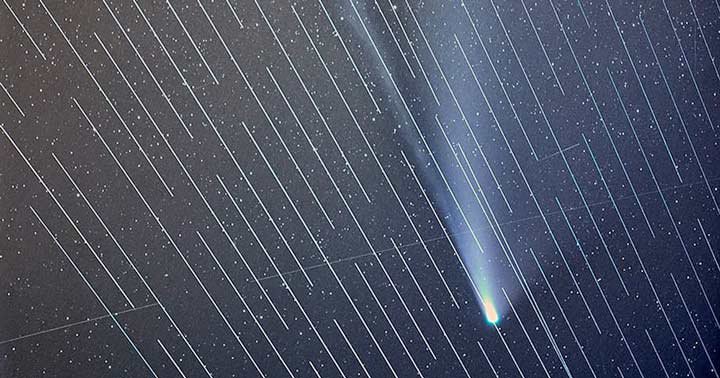
Hate is a strong word, but commerce and capitalism seem to have been more important than science for Starlink.
And then, there is the allure of affordable, high speed, reliable satellite internet for RVers. We love our RVDataSat 840. It allows us to get online anywhere with a clear view of the southern sky. Our MobilSat satellite internet works in Alaska. And it lets us work from anywhere, with poor cellular service, or no connection at all. And yes, it is expensive.
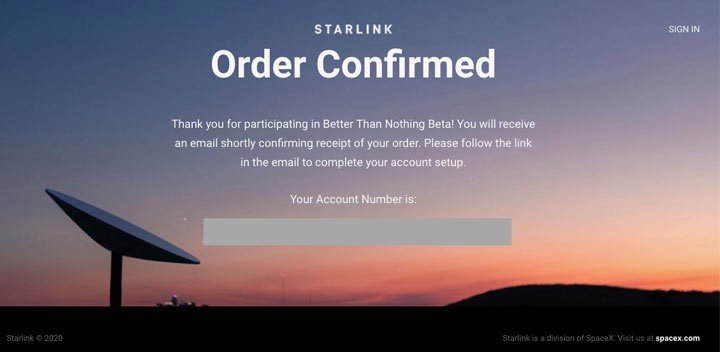
I see this image, and think of the Very Large Array. It looks like a massive radio antenna. In reality, the Starlink satellite dish is very compact and lightweight. But there I go digressing again…
Starlink Satellite Internet Beta Program
Then, my dear friend informed me that he signed up for the Starlink beta program. Then he showed me the package he received, and the speeds he’s getting. I asked about the cost. And the jealousy set in.
“My friend, when StarLink goes full release. It’s going to change your life.?? ????
Our RVDataSat system is bulky, heavy, and mounted to the roof of our trailer. The initial investment was $7500± including installation and service. The Starlink package is lightweight, and apparently simple to set up.
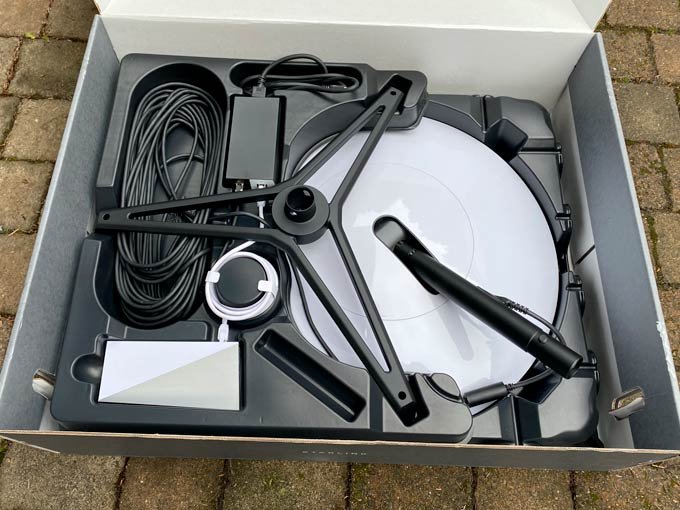
The small dish is fully automated. My friend says you can assemble it, plug it in and the system auto sets up in about five minutes. The initial set-up package he received (Dish, Router & Power Supply) was $500 and the satellite internet service costs $99 per month. This is considerably less than our current RV satellite internet solution from MobilSat. Oh, and he assures me there is? “NO FAP”! (Fair Access Policy, aka: Data Cap)
So what is keeping Starlink satellite internet for RVers from being a real thing? There is no apparent reason this setup can’t be 100% mobile as is. For starters, the program is still in Beta and not readily available to the public nationwide. More importantly for RVers, however, is the geo-fence limitation. He says, “My understanding is they are currently geofenced around the??address of the beta test property.” He adds, “Not sure if this is to ensure the data they are getting during the test. Or if they will keep them that way and charge differently for mobile.”
With geo-fencing enabled, Starlink is not a viable solution for mobile internet. But it makes sense that Starlink will offer a fully mobile satellite internet option for RVers and digital nomads. We’ll just have to wait and see. So what about those speeds?
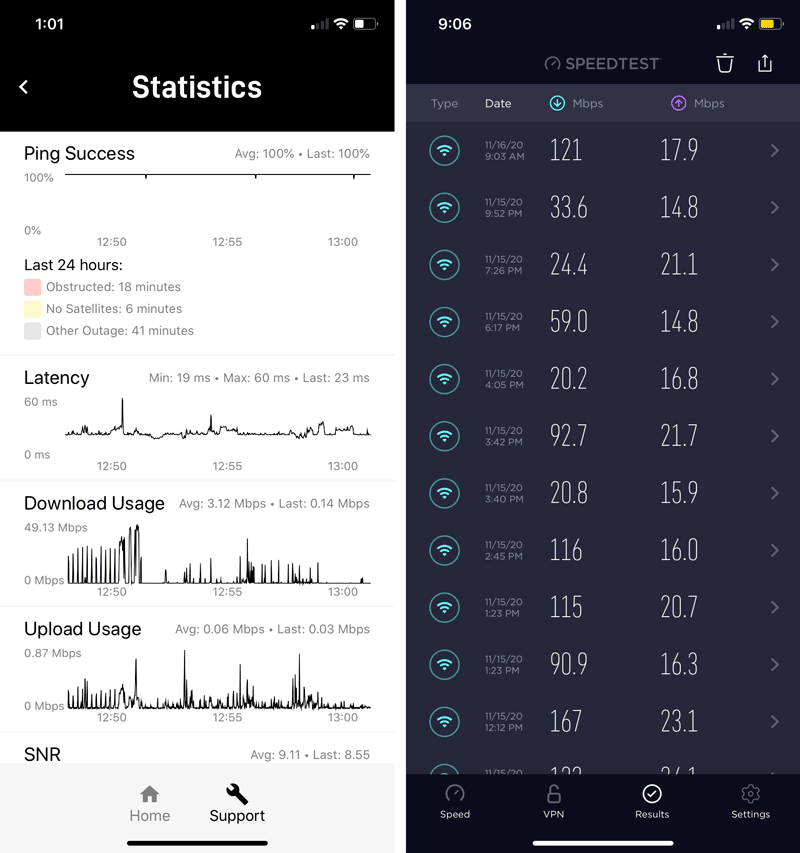
In these tests from northern coastal Washington with clear weather, my friend got Starlink download speeds up to 121 Mbps. Starlink upload speeds were up to 24.1 Mbps. The average latency is noteworthy too compared to geostationary satellite based service.
These speeds are pretty impressive for satellite internet. And with no data cap, Starlink becomes more and more alluring. Once the system can be used outside the geo-fence, it seems ideal for use on the road. Then it only becomes a matter of coping with the reality of supporting a company that may be destroying astronomical research for many scientists. Ironic really, considering that is the technology that enabled and supports their product development. But then, we do this already by supporting the Great Satan as such Prime consumers.
Check out Starlink on Reddit for more user reviews and discussion, or to keep tabs on progress of nationwide deployment. If we hear about any sort of mobile solution once Starlink is available to the public, we’ll be sure to let you know. Subscribe here to be notified of future posts and reviews. Or check out all of our satellite internet posts from the past 13+ years as location independent
UPDATE – For more current information about Starlink for RVers visit the Mobile Internet Resource Center:
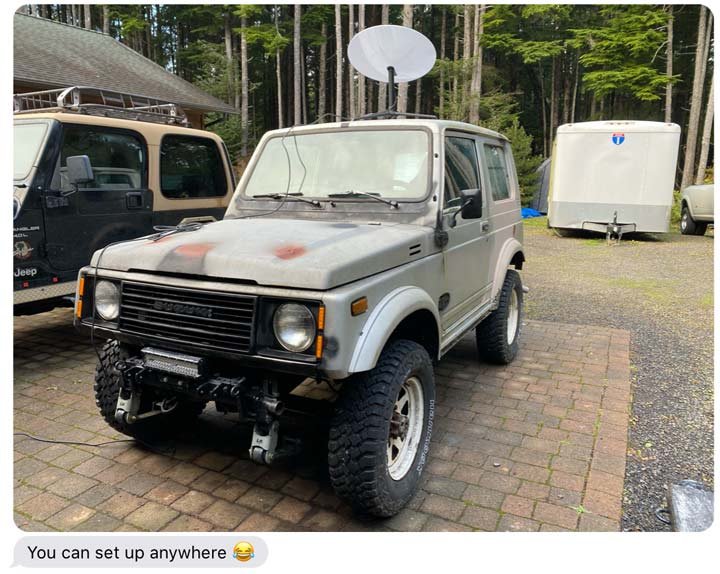
While I fully understand the effects of Starlink satellites on astronomy (my daughter is studying to be an astrophysicist and thinks Elon Musk is the devil incarnate), might I point out a brighter side (pun intended) of the story? It’s thought that one of the reasons that Elon is creating Starlink is to create a revenue stream that will help him develop SpaceX’s Starship rocket. The capabilities and cost effectiveness of Starship would bring the price of putting things into space down by orders of magnitude, in turn bringing the prices of lunar and space-based astronomy down into the reach of mere mortals. Without Earth’s atmosphere in the way, the clarity of extraterrestrial observations will literally open up whole new worlds to our astronomers.
Great point @SkunkBucket. That’s one way to look at it. Thanks for sharing.
… to a certain extent geofencing may become an issue. Canadians who RV south ( whenever that’s again ‘allowed’ ) may or may not have to deal with the issue of content provider based geofencing rules where the content from say, Netflix is different than what American subscriber’s get due to broadcast rights. How do they deal with BBC iPlayer which is restricted to the UK? Or content the Russians or Chinese ‘clandestine’ subscribers can access outside of the restrictions normally placed on their ISP’s by their government minders… maybe some repressive governments are getting a tad nervous. It will be interesting to see if Starlink actually democratizes an internet that is increasingly becoming balkanized. I live in Mexico where government restrictions are not an issue, but content provider restrictions may be. We shall see and yes I have applied and paid the deposit to be an early adopter here in Estado de Jalisco.
“Dear Freind” here 🙂
Update from StarLink regarding mobility:
“Mobility options – including moving your Starlink to different service addresses (or places that don’t even have addresses!) – is coming once we are able to increase our coverage by launching more satellites & rolling out new hardware and software.”
So it’s in the plan…
Thanks for the feedback my friend!
I understand that there is a $100 adapter if you want to put it on your roof. But a major issue is that the Starlink antenna requires a large section of open sky to work. Maybe no more camping in the trees. Also there are a limited number of satellites in view and the more people using it in a local area the slower it will get. So better rural than urban. Not a problem for me and maybe not much of a problem if they get 10,000 sats up.
But I’m watching and hoping it will work.
There is a $25 flat bolt down roof mount and a $99 “Ridge Line” mount that straddles a Stick House roof ridge line and is weighted down with bricks so you don’t have to drill into your roof.